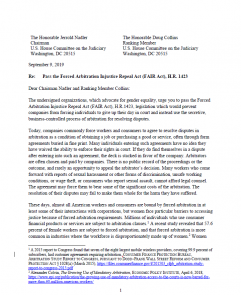 Re: Pass the Forced Arbitration Injustice Repeal Act (FAIR Act), H.R. 1423
Re: Pass the Forced Arbitration Injustice Repeal Act (FAIR Act), H.R. 1423
Dear Representative:
The undersigned organizations, which advocate for gender equality, urge you to pass the Forced Arbitration Injustice Repeal Act (FAIR Act), H.R.1423, legislation which would prevent companies from forcing individuals to give up their day in court and instead use the secretive, business-controlled process of arbitration for resolving disputes.
Today, companies commonly force workers and consumers to agree to resolve disputes in arbitration as a condition of obtaining a job or purchasing a good or service, often through form agreements buried in fine print. Many individuals entering such agreements have no idea they have waived the ability to enforce their rights in court. If they do find themselves in a dispute after entering into such an agreement, the deck is stacked in favor of the company. Arbitrators are often chosen and paid by companies. There is no public record of the proceedings or the outcome, and rarely an opportunity to appeal the arbitrator’s decision. Many workers who come forward with reports of sexual harassment or other forms of discrimination, unsafe working conditions, or wage theft, or consumers who report sexual assault, cannot afford legal counsel. The agreement may force them to bear some of the significant costs of the arbitration. The resolution of their disputes may fail to make them whole for the harm they have suffered.
These days, almost all American workers and consumers are bound by forced arbitration in at least some of their interactions with corporations, but women face particular barriers to accessing justice because of forced arbitration requirements. Millions of individuals who use consumer financial products or services are subject to arbitration clauses. A recent study revealed that 57.6 percent of female workers are subject to forced arbitration, and that forced arbitration is more common in industries where the workforce is disproportionately made up of women. Women are close to two-thirds of the workforce in jobs that pay the minimum wage or just a few dollars above it, and more than two-thirds of workers in tipped jobs. Women of color are particularly overrepresented among tipped workers and other low-wage workers. Because forced arbitration is more common in low-wage workplaces, it has a particularly detrimental impact on women generally and women of color specifically.
The lack of public accountability enabled by forced arbitration has played a harmful role in allowing sexual harassment and assault to persist in the shadows. In the nearly two years since #MeToo went viral, thousands of individuals have come forward to share their experiences – many several years after the fact – and to demand justice.
When individuals share their experiences of assault, harassment and discrimination, it gives others the courage to come forward as well. But when women who report such conduct at work, at a spa or nursing home, or during a rideshare are forced into arbitration, that secretive process with no public accountability further silences victims. As the following stories demonstrate, arbitration allows companies to hide the true extent of illegal conduct from workers and the public, and helps wrongdoers evade accountability, which can isolate individuals and prevent them from coming forward.
- Saturnina Plasencia, a Latina single mother of four, worked for $13/hour in a Dollar Store in New York. Her general manager regularly sexually harassed her and, after she refused his sexual demands, she alleged she was given fewer hours than new female hires. When she told him she was pregnant, he angrily responded “The baby could have been mine.” Saturnina did not realize when she started work that she had signed a mandatory arbitration agreement, and her case is now in arbitration. Her case is supported by the TIME’S UP Legal Defense Fund, which is housed and administered by the National Women’s Law Center Fund.
- Thousands of current and former Chipotle employees were forced to work hours off the clock without pay. When those employees were part of a class action lawsuit seeking justice over wage theft, Chipotle forced many of them to arbitrate their claims on an individual basis.
- When Uber riders who alleged that they had been sexually harassed and assaulted by drivers brought a class action lawsuit against Uber for failing to properly screen its drivers, Uber tried to force them into arbitration. After a public outcry Uber agreed to allow some of the claims to go to court and eventually settled the case. In May 2018, Uber modified its policy and no longer requires forced arbitration of individual claims of sexual harassment or sexual assault of Uber riders, drivers or employees; however, it still requires arbitration of other types of claims.
These brave individuals came forward to expose misconduct at great risk to their jobs and safety. Now it’s time for Congress to enact legislation so that workers and consumers are no longer silenced, and are no longer forced into arbitration when their rights have been violated.
The FAIR Act restores power to workers, consumers, servicemembers, and nursing home residents by allowing them to choose whether to pursue their dispute in court or in arbitration, rather than being forced into arbitration up front. The FAIR Act would also prevent corporations from stripping away the rights of workers and consumers to come together to form class actions to address systemic and widespread corporate wrongdoing.
The FAIR Act is an important tool in helping women to expose misconduct and enforce their rights. Accordingly, we strongly urge you to pass the FAIR Act. If you have any questions, please contact Emily Martin at the National Women’s Law Center.
Sincerely,
(see full list of organizations)

